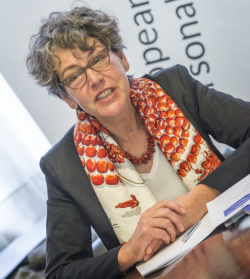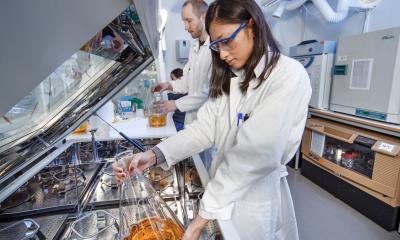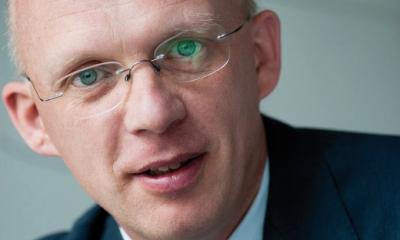Personalised medicine
Many issues must be resolved
Hardly any topic has been discussed as broadly as personalised medicine, with countless stakeholders, ministries and organisations involved. That’s good news says Professor Angela Brand, Professorial Fellow at the Maastricht Economic and Social Research Institute on Innovation and Technology (MERIT) and Professor at the Department of Health, Medicine and Life Sciences at Maastricht University. ‘We should use this attention. Right now, many activities come together and move in the right direction. That is a huge success.’ Whilst she was enthusiastic about the current developments when EH met with her at the European Health Forum in Gastein she also demanded a profound change in approaches and a reorientation of orthodox medicine.
Report: Marcel Rasch

Personalised Health has turned into a buzzword and there are many parties interested in the subject,’ Professor Brand points out. ‘However, there is considerable confusion about the terminology and tasks of public health and personalised medicine. I strongly recommend using the terms personalised health and care because that is what personalised medicine and the reorientation of public health are all about.’
Orthodox medicine is coming of age
One feature that characterises personalised medicine is the use of tools and apps that work hand in hand and allow certain analyses. ‘In the past, physicians treated their patients with therapies that were based on comprehensive studies but were not adjusted to the individual patient. This latter approach is entirely new,’ Professor Brand points out. While traditional medicine, with its thousands of years of experience, has always had a holistic view and an individual perspective, Western orthodox medicine focused on evidence-based medicine, with evidence culled from large populations. ‘Today, we see a turn towards a higher degree of individuality, albeit in a different context and with adjusted methods,’ she underlines.
For the first time there seems to be a rapprochement of orthodox and traditional medicine. ‘The advantage of these old, non-orthodox approaches is the fact they have always taken into account the dynamics of highly complex and interdependent environmental and genomic factors on the individual level, for example, when we are looking at cancer. In my opinion the highest hurdle is the integration of this dynamics into Western orthodox medicine. We need to answer the question what we will do when results cannot be reproduced across population-based clinical studies because of the individuality of the disease and the patient,’ Professor Brand urges.
Politics is prepared to move – physicians are stalling
Over the past two years a consortium of ministries and funding bodies, funded by the EU and headed by German experts, has been working on ‘Shaping Europe’s Vision for Personalised Medicine’*. The team developed a roadmap to define the five major challenges (see box). ‘The role of the individual – patient and citizen – must take centre stage, particularly in view of Big Data and of information and communication technologies. Moreover, issues around access and sustainable healthcare systems have to be clarified,’ Brand stresses.
However, many physicians appear to be apprehensive. The implementation of a project in Malta, which was fully defined, failed because the GPs opposed it, as she explains: ‘A discussion with the ministry in Malta quickly revealed that the health data cooperative was grounded because the physicians thought it created too much transparency.’
Brand does not consider tightening the laws or EU rules to be a solution. ‘Quite the contrary, we should try to decrease regulation and to offer guidance and support, so that we can think about how the challenges should be approached. Tightening the rules will have the exact opposite effect.’ For Brand issues such as ‘drug development, reimbursement of prescription drugs, evaluations and health technology assessment, are but parts of the overall challenge. As physicians we have to deal with “best available evidence”, which might differ considerably from the results of the large randomised controlled studies. These issues have to be advanced.’
Brand clearly states the shortcomings and demands; she has great confidence in the future: ‘For physicians this is not about power games; it’s about how we define our role going forward. In the future the informed patients and citizens will be the master of their data in the cloud and they will be very careful whom they are going to trust. We should consider this an opportunity, not a threat.’ ‘IBM’s analysis tool Watson is quite controversial among physicians,’ Brand explains. ‘That’s why we asked an IBM representative to join us on the consortium and help us to optimise the system. I am convinced that, in the future, we will have many more such support tools.’
| Identified challenges 1 – Developing awareness and empowerment 2 – Integrating big data and ICT solutions 3 – Translating basic to clinical research and beyond 4 – Bringing innovation to the market 5 – Shaping sustainable healthcare |
* PerMed: Shaping Europe’s Vision for Personalised Medicine. Strategic Research and Innovation Agenda (SRIA) www.permed2020.eu
PROFILE:
Having worked in clinics, at various academic institutions and in governmental bodies in the USA and Germany, today Angela Brand MD PhD MPH (USA) is Full Professor at the Faculty of Health, Medicine and Life Sciences (FHML) and Professorial Fellow at Maastricht Economic and Social Research Institute on Innovation and Technology (MERIT), Maastricht Graduate School of Governance, Faculty of Humanities and Sciences (FHS), Maastricht University, The Netherlands. The professor is paediatrician, specialist in Public Health Medicine, holds a PhD in pathology, a Master of Public Health (MPH) from Johns Hopkins University, USA, and received her habilitation focusing on Health Technology Assessment. Brand also directs the European Centre for Public Health Genomics (ECPHG) and is the Dr T M Pai Endowed Chair on Public Health Genomics and Adjunct Professor at the School of Life Sciences at Manipal University, India.
11.11.2016





